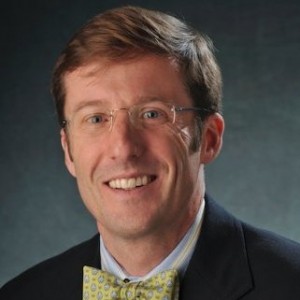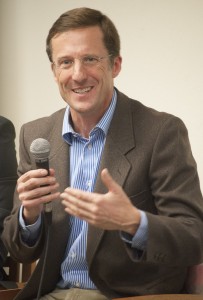David Payne is a sustainability consultant and instructor at University of Colorado Boulder’s Leeds School of Business. In addition to teaching about B Corps in his Business Sustainability and Ethics courses, he has worked closely with B Lab’s Colorado office and is the faculty advisor to UC Boulder’s Net Impact Chapter. As an instructor, consultant and mentor, David reminds us that there are many different ways to be involved with and positively contribute to the impact space. We asked him to briefly share his journey and hope that it encourages others to find ways to make their mark in this space as well. David recounts:
After working in the dot com industry and selling my company, I took time off to sail on my boat and read as much as I could. In 1999 an article called the Roadmap for Natural Capitalism was published which lead me to the book Natural Capitalism by Amory Lovins, Hunter Lovins and Paul Hawkins. Even today, I would highly recommend it (download it here!) because the core theory still holds and I’ll never forget the impact it had on my worldview.
During that time, I was also volunteering and attending conferences, where I made a point of asking bold questions. A defining moment in my life happened at a CERES conference, when I raised my hand and flat out asked the members of the panel if I could get a job with them. Fortunately for me, it worked! Amory Lovins gave me his business card on the way out and ten days later I was on my way to Colorado as the newest employee of his think tank, Rocky Mountain Institute.
My experiences there challenged me to think more about all that was written in Natural Capitalism. The phrase “do more, better, with less, for longer” adequately sums up the theories and the book encourages cradle to cradle thinking as well as investing in human and natural capital as if we were managing any other asset. It just makes sense. With any other asset, you make it pay off in the long run by living off of the interest without consuming the capital. If you start consuming the capital, you begin to diminish the business itself. Taking those concepts and applying it to human and natural capital resonated with me. To help others understand, I phrase it as “unsalable product” instead of “waste”. It actually isn’t good business to be making things that you aren’t getting paid for, which would be this waste or unsalable product.
The mission of B Corps resonates deeply with me as well and I make a point of weaving them into final assessment projects for my students. In teaching the class on sustainable business at the Leeds school, I’ve been able to introduce them to the B Corps movement and we use the B Impact Assessment regularly. It is a perfect way to show students how the topics in ethics that we discuss can manifest in the business world. As part of the class, my students create their coat of arms, list their top four values and use those values to make decisions that develop better solutions to key issues. We do temperament and strengths assessments and I require them to define their theory of change so that we can tease out how better business can help them achieve that change.
Chatting with David was exhilarating and it was refreshing to hear the utter passion he has for the work he does and his efforts to inspire the next generation of socially responsible leaders. David also has his own sustainability consulting company, Point 380, which was named for the level of CO2 in the atmosphere when the firm was founded. He reminds us with heavy disappointment that CO2 levels are well over 400 today and that it is our duty to make decisions with the health of our planet in mind.
Connect with David: Website LinkedIn




